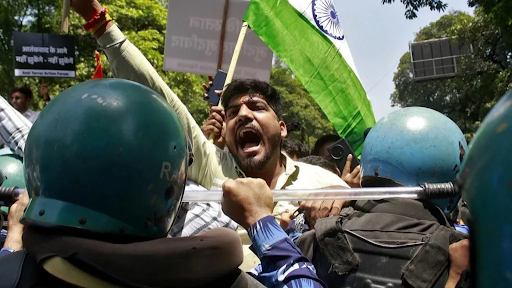
A protester yells as police stop him during an anti-Pakistan rally in Delhi. REUTERS
Pakistan has taken strong steps against India following a deadly militant attack in Indian-administered Kashmir that killed 26 tourists. The attack occurred on Tuesday near Pahalgam, a popular resort in the disputed Himalayan region. In response to the violence, Islamabad suspended all visas given to Indian nationals under an exemption scheme. Pakistan also expelled Indian diplomats, closed its airspace to Indian flights, and halted trade with India.
The Indian police have named three suspects involved in the attack. They claim two of the gunmen are Pakistani citizens, while the third is a local Kashmiri man. Indian authorities say the attackers are linked to the militant group Lashkar-e-Taiba (LeT), which operates from Pakistan. However, Pakistan has denied any involvement in the attack, stating that there is no credible evidence to support India’s claims.
After the attack, Indian Prime Minister Narendra Modi made a strong statement, vowing to track down and punish all terrorists responsible for the killings. He promised that "India will identify, track and punish every terrorist and their backers" and added that the country’s enemies would face a punishment greater than they could imagine. Modi also declared that terrorism would never break the spirit of India.
In retaliation, India announced several measures against Pakistan. These included shutting the Attari-Wagah border and canceling visa services for Pakistani nationals. Pakistan responded by rejecting India’s decision to suspend the Indus Water Treaty, a 60-year-old water-sharing agreement between the two countries. Pakistan warned that any attempt to block or divert the water from the treaty would be seen as an act of war.
Pakistan also took additional diplomatic steps, including reducing the number of diplomats in India’s High Commission in Islamabad. Pakistan ordered Indian defense, naval, and air advisers to leave the country by April 30.
The tragic attack in Kashmir left many people grieving. Among the victims were an Indian naval officer on his honeymoon, a tourist guide who supported his family, and a businessman on holiday with his wife and children. The families of the victims are now mourning their loss, and the bodies of the deceased are being sent back to their home states for funerals.
In the aftermath of the attack, security forces in Kashmir detained around 1,500 people for questioning. Schools, businesses, and shops have begun reopening after the region's shutdown in response to the attack. Police have announced a reward of 2 million rupees (about $23,000) for anyone who provides information about the attackers.
Sadly, the attack also triggered harassment of Kashmiri students in different parts of India. Videos have surfaced showing students being threatened and assaulted by right-wing groups. While these videos have not been independently verified, they reflect the rising tension and fear in India following the attack.
As of now, Indian soldiers are patrolling the streets of Srinagar, the largest city in Jammu and Kashmir. The situation remains tense, and both countries seem to be preparing for further diplomatic and military actions.















